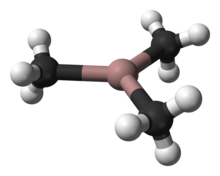Trimethylgallium

| |

| |
| Names | |
|---|---|
| IUPAC name
trimethylgallane, trimethanidogallium
| |
| Identifiers | |
3D model (JSmol)
|
|
| ChemSpider | |
| ECHA InfoCard | 100.014.452 |
PubChem CID
|
|
CompTox Dashboard (EPA)
|
|
| |
| |
| Properties | |
| Ga(CH3)3 | |
| Molar mass | 114.827 g/mol |
| Appearance | clear colourless liquid |
| Melting point | −15 °C (5 °F; 258 K) |
| Boiling point | 55.7 °C (132.3 °F; 328.8 K) |
| Hazards | |
| Main hazards | pyrophoric |
Except where otherwise noted, data are given for materials in their standard state (at 25 °C [77 °F], 100 kPa). | |
| Infobox references | |
Trimethylgallium, often abbreviated to TMG or TMGa, is the organogallium compound with the formula Ga(CH3)3. It is a colorless, pyrophoric liquid.[1] Unlike trimethylaluminium, but akin to trimethylindium, TMG is monomeric.[2]
Preparation[]
TMG is prepared by the reaction of gallium trichloride with various methylating agents. These include methyl lithium,[1] dimethylzinc, and trimethylaluminium.[3] The less volatile diethyl ether adduct can be prepared by using methylmagnesium iodide in ether. The ether ligands may be displaced with liquid ammonia as well.[4]
Applications[]
TMG is the preferred metalorganic source of gallium for metalorganic vapour phase epitaxy (MOVPE) of gallium-containing compound semiconductors, such as GaAs, GaN, GaP, GaSb, InGaAs, InGaN, AlGaInP, InGaP and AlInGaNP.[5] These material are used in the production of LED lighting and semiconductors as a metalorganic chemical vapor deposition precursor.
References[]
- ^ a b Bradley, D. C.; Chudzynska, H. C.; Harding, I. S. (1997). "Trimethylindium and Trimethylgallium". Inorganic Syntheses. Inorganic Syntheses. 31. pp. 67–74. doi:10.1002/9780470132623.ch8. ISBN 9780470132623.
- ^ Greenwood, Norman N.; Earnshaw, Alan (1997). Chemistry of the Elements (2nd ed.). Butterworth-Heinemann. ISBN 978-0-08-037941-8.
- ^ Gaines, D. F.; Borlin, Jorjan; Fody, E. P. (1974). "Trimethylgallium". Inorganic Syntheses. Inorganic Syntheses. 15. pp. 203–207. doi:10.1002/9780470132463.ch45. ISBN 9780470132463.
- ^ Kraus, C. A.; Toonder, F. E. (1933). "Trimethyl Gallium, Trimethyl Gallium Etherate and Trimethyl Gallium Ammine". PNAS. 19 (3): 292–8. Bibcode:1933PNAS...19..292K. doi:10.1073/pnas.19.3.292. PMC 1085965. PMID 16577510.
- ^ Shenai-Khatkhate, D. V.; Goyette, R. J.; Dicarlo, R. L. Jr; Dripps, G. (2004). "Environment, health and safety issues for sources used in MOVPE growth of compound semiconductors". Journal of Crystal Growth. 272 (1–4): 816–21. Bibcode:2004JCrGr.272..816S. doi:10.1016/j.jcrysgro.2004.09.007.
- Chemical vapour deposition precursors
- Gallium compounds
- Methyl complexes